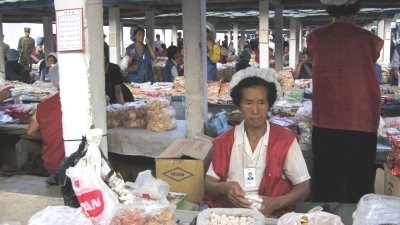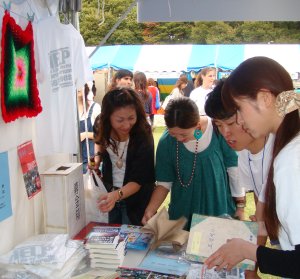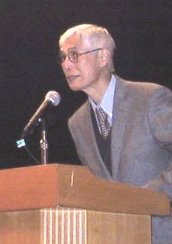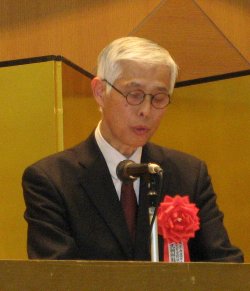Category Archives: North Korea
Panicked Chinese Students Evacuated
Yanji, China
North Korea’s second nuclear test on May 25 shocked the world and caused the strongest tremor ever to hit the border area between China and North Korea. People in the region feared that it was another huge earthquake like the recent one in Sichuan. Fortunately, I had lived in Japan long enough to be familiar with earthquakes, so I did not panic. However, most people living in the border area were clearly terrified.
What Repatriated NK Refugees Must Endure
Below is our interview with a North Korean defector.
“I escaped into China on November 27, 2008. This is my fifth escape. I have no place to go. Let me die here or please help me.”
The temperature outside is already down to -10°C and it will continue to fall. Hong Song-man, 65 years old, begged the interviewer (an LFNKR local staff member) for help, pleading with tears in his eyes. He said he had previously stayed in a village in Helong, Yanbian Korean-Chinese autonomous state of Jilin Province, where villagers helped him.
Japanese Wives Victimized By Brokers
Brokers ‘help’ through threats, intimidation
Ms. Hiroko Saito, the Japan-born wife of a North Korean, was arrested in Japan on March 8 this year by Osaka Prefectural police. The woman, who had earlier escaped from North Korea and made her way to Japan, was arrested together with a Chinese couple on suspicion of violating the Immigration Control Act. She is suspected of falsely stating that the Chinese couple are relatives so that they could enter Japan illegally.
First Hints of Free Journalism for North Korea
Japanese Language Magazine Reports from inside North Korea
North Korea is increasingly attracting world attention because of its recent missile launch and the issue of who will succeed Kim Jong-il. These issues should motivate us to step up our efforts to discover what is happening inside North Korea and how the common people are doing there.
The flood of news about the missile launch, which usually depends on official North Korean announcements, helps hide signs that the badly weakened Kim Jong-il regime cannot afford to feed its soldiers and that the majority of common people see their leader’s policies as failures. I believe that, to deal with North Korea, it is increasingly urgent to focus on the real picture there, rather than possibly over- or under-estimating the regime.
North Korea suffers from a serious ailment. All the neighboring countries in East Asia, as well as the US are very well aware that the country’s illness is critical, and they are willing to help North Korea. They hope for the nation to become a healthy, normal country as soon as possible. However, none of the concerned countries has been able to identify the cause or locate the wound. Therefore, they have not yet been able to properly diagnose or treat the condition.
Although the international community is very willing to find the cause of this serious illness, the patient, North Korea, will not disrobe, will not even allow its pulse to be taken.
The North Korean regime has confined itself inside a deep hole, with no sign that it wishes to come out. The regime, completely isolated from international society, is unlikely to heal itself without outside help.
What is needed first is a proper diagnosis of the illness. This requires that highly accurate, reliable information on the internal condition of North Korea be consistently supplied to the outside world. A diagnosis based on inaccurate or inadequate information could lead to a misdiagnosis, leading to a delayed cure or even a worsening of the illness.
This is why I decided to plant the seeds of journalism in North Korea.
North Korea is currently going through a dramatic change. During the past 15 years, the commercial transactions started by common people after the economical failure of the nation have enormously developed with a resultant rapid growth of market economy.
Concurrently with the growth of the market economy, more people are beginning to go for self-sustained living. More people think for themselves, make their own decisions and take action. In other words, the people’s way of thinking and their sense of values are significantly changing.
The magazine features comments from common people in North Korea collected by Rimjingang reporters living underground while in the country. The comments represent true public opinions of the people living under this tyranny.
These public opinions may help provide the materials to help reach a proper diagnosis of the serious illness of the North Korean society.
Report by Jiro Ishimaru
(Publisher of Rimjingang, Asiapress)
Go here to read a brief introduction of Mr. Jiro Ishimaru and the “Rimjingang” magazine.
LFNKR Comments:
Even while North Korea still has many helplessly starving people, a growing number of individuals have begun to take matters into their own hands, setting up to sell small goods along roadsides or under bridges. They are seeking a private income for survival in response to the collapse of the government’s economic policy.
To discourage the spread of private selling, the government has set up public markets for small merchants, such as the one shown below.

The owner of each 1-sq-meter booth sells food in a publicly-run market in Kang-dong, a suburb south of Pyongyang. (Photo by Chang Jung-gil, a reporter with Rimjingang, the magazine published by Jiro Ishimaru, Asiaoress.)
Letter Sent to US Secretary of State
LFNKR has submitted, through the American Embassy in Tokyo, the following letter to the new US Secretary of State, Hillary Clinton who is visiting Japan from Feb. 16, 2009:
To: Secretary of State Hillary Clinton
From: Life Funds for North Korean Refugees (NPO), Tokyo, Japan
Re: Human Rights in North Korea
February 10, 2009
Dear Secretary Clinton,
May we congratulate you on your appointment to the post of Secretary of State, a position which is more vital in today’s world than ever before. And we welcome your visit to Japan and hope that your discussions with the Japanese government are fruitful.
Global Festival in Tokyo Proves Popular

Almost Eighty Thousand Attend
A Global Festival to commemorate the global citizenship of every person on earth was held for two days in Tokyo, beginning on Oct. 6, which is designated International Cooperation Day. The event was hosted by the Japanese Ministry of Foreign Affairs, Japan NGO Center for International Cooperation, Japan International Cooperation Agency (JICA), and Japan Bank for International Cooperation.
LFNKR’s Kato Addresses Int’l Conference

Speakers included: Willy Fautre (Human Rights without Frontiers, President); Vincent Brossel (Reporters without Borders); David Hawk (human rights investigator and advocate and author of “the Hidden Gulag”); Chuck Downs (US Committee for NK HR); and Hiroshi Kato (Life Funds for North Korean Refugees).
Text of Kato Hiroshi’s Speech
It is my privilege and honor to present this speech here at the North Korean Human Rights Campaign 2008
Our main purposes at Life Funds for North Korean Refugees are: first, to provide humanitarian aid and protect the human rights of North Korea defectors in China and Southeast Asia; and second, to reach out to people in North Korea with food and medicine.
Out of 100,000 North Korean refugees hiding out in Northeastern China, about 70-100 are under LFNKR’s protection as of July 2008.
In my opinion, the worst form of human rights violation is human trafficking. The number of human trafficking victims is not yet clearly known, but we estimate the number to be more than 70% of all defectors. An investigation conducted in the villages where our shelters are located showed that 10-20% of all villagers are North Korean women who have been sold to Chinese men in the village. Out of 60,000-70,000 women defectors, at least half are of childbearing age.
Babies between Han Chinese and ethnic Koreans will reach 30,000-35,000, most of whom are unregistered.
The youngest victim of human trafficking I have met was 8 years old at the time she was sold. She was brought up in an ethnic Korean family in Heilong City, Jilin Province, but was sold for 1,500 RMB to an ethnic Chinese man at the age of fourteen. She gave birth at the age of 19. After the baby was born, she was sold again by a broker to a different man, and unfortunately I do not know where she is now. Girls being sold by a broker after childbirth are now very common to see.
The price of women varies: usually 5,000-10,000 RMB (approximately $500-1,000 US dollars), for girls up to the age of 20; 3,000-5,000 RMB (or $300-500 US dollars), for up to the age of 30; 2,000-2,500 RMB ($200-250 USD) for up to the age of 40 with a child; and 500-1,000 RMB (or $50-100 US dollars) for children.
However, this year, the price has increased. A woman in her 20s is sold at the price of 20,000 RMB because the number of female North Korean defectors is decreasing. North Korean women seem hesitant to escape the country due to the crackdown operation for the security of the Beijing Olympic Games, as well as forced repatriation that entails serious threats to life upon being returned to North Korea.
The trafficking of North Korean women goes back to 1985 when it was not yet as systematic. It was mere match-making organized by a broker for a rural Chinese man who could not marry in an orthodox way. At that time, the Chinese government welcomed them, and there was neither arrest nor forced repatriation. (But this has now become an organized business-like activity.)
Young women from three provinces in Northeast China that were excluded from China’s open economy reform policy started to move to the Southern China Economic Zone, Japan and Korea to find work. As a result, the female population in these rural areas has decreased considerably. The demand for North Korean women naturally became greater. The role of young North Korean women in replacing ethnic Chinese women was considered significant. The brokers taking advantage of the situation started to appear during this time and it became more organized and business-like.
In the late 1990s, the food rationing system of North Korea collapsed.
North Koreans seeking food started to escape to China, and from 1997 there was a massive influx of people from North Korea into China.
Ethnic Koreans in China provided their starving brethren with food and clothing. However, due to some people trying to take advantage of the goodwill of these ethnic Chinese, and an increased crime rate, the Chinese government started to strengthen the policy concerning North Korea defectors.
In 2000, trafficking of North Korean women became more serious. More women had risked their lives escaping to China and fell into the clutches of brokers. The reports made by staff members in charge of our shelters outlines many of these cases.
The Chinese police, in secret communication with the North Korean National Security Agency, has prosecuted these women who are illegally married to rural Chinese men. If a woman who had a child at the time of marriage is prosecuted, then the child no longer receives any protection and becomes an orphan. The child usually survives by helping with farming, taking care of cows in return for room and board.
The children of North Korean women sold to Chinese men face a bleak future. An infant can choose neither his or her own country nor parents. A mother has no choice but to sell herself.
Because the stay of these women is illegal their children are also stateless. They are not Chinese and not North Koreans either. They have no right to education or anything else. They have no human rights and are staying illegally. These children are languishing in extreme poverty.
Early last year, the mother of 5-year-old Kim Yong-soon was arrested and repatriated to North Korea. Her crime? Leaving the starvation in North Korea and seeking survival in China.
But once this young woman had escaped North Korea six years ago, she was quickly sold into a forced marriage to a Chinese man, and just as quickly became pregnant. This is how she came to give birth to daughter Kim Yong-soon. The daughter, Yong-soon is now being supported under LFNKR’s foster parent program.
Our people, the LFNKR local staff in China, reported to us that it will be impossible for her to return again, since this is her third repatriation.
You know, you have to wonder why it is that Chinese government policies show no mercy to families. They callously tear them apart, separating mothers and children with no regard to human feeling.
In Yanji, Longjin, and other cities near the border between China and North Korea, the two countries have intensified their joint crackdown.
North Korean authorities provide Chinese security police with information on North Korean defectors, and the Chinese police follow up relentlessly. These police personnel are highly motivated — their government is paying high bounties. For each North Korean refugee they arrest, someone puts 2,000 RMB in their pocket. That bounty payment equals the monthly salary of most university graduates in China.
Over the years, human rights NGOs, International organizations and foreign governments have made numerous appeals. They have asked the government of China about this issue of North Korean defectors in China.
The Chinese government has ignored these appeals. In fact, they have never bothered to respond at all, and meanwhile they continue to forcibly return North Korean refugees to face the certainty of brutal persecution in North Korea. This is an obvious and blatant defiance of humanitarianism. The Chinese government clearly has no interest in what the international community thinks.
UNHCR’s appeals to the government of China are always ignored. Beijing has also ignored the appeals of the South Korean government on behalf of aid workers arrested for helping North Korean refugees.
The two lessons to be learned from past incidents are these: first, China responds only to a strong show of force. And second, the last thing that works with the Chinese government is an appeal to humanitarian consideration. China is submissive to the stronger, but shows no mercy to the weaker.
The North Korean defectors are in a position of strength when they are in the custody of foreign embassies and weak if they are outside the custody of a strong power.
I now publicly issue a call to all South Korean activists and North Korean defectors. From this moment forward, I urge you to direct your efforts to collecting evidence, testimony and information that provides full details for the international community in general and the UN Special Rapporteur, in particular.
In addition, we all should take this occasion to acknowledge, with profound thanks, all the efforts that have led to successfully exposing North Korean Crimes against Humanity. We can be proud of the widespread call for justice that was demonstrated by the passage of the North Korea Human Rights Act in the US Congress, the series of resolutions adopted by the UN, among many others, and the resolution on human rights in DPRK, which the UN General Assembly approved last December.
As a next step, I would like to see the UN Security Council raise the issue of creating an International human rights investigation team to be dispatched to North Korea. I do recognize, however, that the chances of that happening are quite slim with Russia and China on the Council. They are very likely to block any such efforts.
Since North Korea’s crimes are of the most serious nature, we cannot just stop here. I suggest that we approach the International Criminal Court by presenting hard evidence, verified information and solid proof. Obtaining this kind of evidence and proof from inside North Korea is definitely a realistic possibility because, in recent years, many North Korean officials have grown increasingly demoralized as they face mounting personal danger in the ongoing power struggles.
We should redouble our efforts now toward obtaining undeniable and credible information from inside North Korea — information that is so strong and so convincing that it must be taken to the International Criminal Court.
In closing my speech today, and with your permission, I wish to personally call upon the entire international community to intervene decisively in the North Korean situation. It is a matter of international responsibility — clearly so.
Let us, therefore, create a living reality that some day all innocent North Korean prisoners, as well as all South Korean and Japanese abductees, will know for a fact that they were never for a single moment forgotten by the people of the world.
Thank you.






